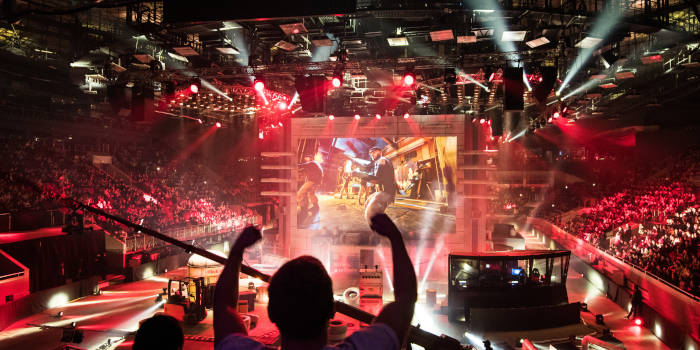Estimated 45% of U-16s Worldwide Engage with Esports Betting Tweets

- Demos and University of Bristol publish survey on U16-s engagement with esports betting tweets
- Online gambling firms use GIFS, memes and funny stories to attract young potential customers
- More control needed amid quickly growing esports market which will hit $30bn in 2020
A new survey by the University of Bristol and Demos has revealed that 28% of U-16s children in the United Kingdom share and follow esports betting content.
Underage Esports Fans Share Betting Tweets
Demos, a research firm, and the University of Bristol’s Department of Management have posted a new report, ‘Biddable Youth Report’ indicating that 28% of people who re-tweeted esports betting related news were under 16 years old in the United Kingdom.
The findings, co-authors Bristol professor Agnes Nairn and Josh Smith say, should serve as a wake-up call for the industry. In any event it confirms something we at GamblingNews.com have long had a suspicion about – the number of esports betting fans who are not of the legal age to place a bet is growing. It’s possible that online gambling companies are using clever marketing content to that end specifically, however.
As the professional playing of computer games grows in popularity with children, so does #esports betting 🎰
— Bristol University 🎓 (@BristolUni) August 20, 2019
New research from @UoBrisEFM and @Demos shows 28% of those engaging with esports betting tweets in the UK are under 16. https://t.co/2zpSKNsQ48 pic.twitter.com/XR5Hzz068R
Based on the survey, the number of esports betting aficionados exceeds that of regular sports fans five-to-one. Meanwhile, the survey has also established that by allowing children under the age of 16 to tweet about esports betting, they were defying UK advertising rules.
Extrapolating from the UK figures, the number of underage would-be esports bettors reaches the impressive 45%, worldwide, a number that shows that the esports betting industry is only now shifting into a gear right now.
Flouting UK Advertising Regulations
Based on the analysis, 74% of all esports tweets and 68% of traditional sports tweets were already non-complaint with established advertising rules. Some of the examples cited by researchers were children sharing posts about:
- Gambling as a genuine source of income
- Encouraging bets on certain games
- Showing young people placing wagers
Based on these findings, the report said that “As most professional esports players are in this age bracket the rules are flouted again and again.” The specific age group in the instances where young people were shown betting on esports were individuals under the age of 25 year old, the authors explained.
To address the issue, the authors of the survey called for better age verification processes as well as a tightener control over who sees the ads and how people are targeted. A Mario Kart advertisement was pulled off in September, 2018 when the Advertising Standards Authority (ASA) accused William Hill of intentionally targeting underage audience.
William Hill responded by arguing that ultimately whoever saw the ad depended on Google algorithms rather than any company’s decision.
Sky has been one of the companies to say that a previously-agreed voluntary water-shed ban spearheaded by betting companies in the United Kingdom is not sufficient. According to the broadcaster’s CEO, Stephen van Rooyen, sportsbooks were simply migrating online.
Save the Kids from Esports Betting, Authors Say
Overall, the authors of the study stated that further research would be needed to identify what was driving children to bet on the outcome of esports – or at least follow and re-share such content. Specifically, the authors recommended that the exact images, videos and other materials should be identified and restricted.
According to Mr. Nairn, the number of individuals involved with esports betting will only be going up:
“With the massive growth in the esports industry, unless action is taken, we can only expect this figure to rise as sports and gambling seem to be inextricably linked.”
Mr. Nairn was particularly well-versed in the vernacular of the Internet, explaining that the targeting of younger individuals was done through clever ploys such as GIFS, memes, pictures and funny stories.
“Our in-depth analysis of the content of gambling advertising Tweets leads us to believe that children’s esports gambling is currently under the radar in two ways: it’s online where parents won’t see it and it’s using clever content marketing.”
Meanwhile, Mr. Smith elaborated further on how children are targeted. The use of specific content led to higher engagement from a younger crowd. As a result, thousands of children in the United Kingdom responded to and followed the content.
“We hope this report serves as a call to action – both to technology companies to make it easier for gambling customers to get a clear picture of what they’re getting into, and to regulators who must continue to ensure that these new actors are compliant with regulation.”
The Biddable Youth Report is also important not only because it serves as a levy against the oncoming waves of esports betting, but also because it gives an estimation of the value of the market – estimated $30 billion by 2020.
GambleAware CEO Marc Etches has said that one in eight children aged 11 to 16 presently followed an esports gambling-related tweet. With the UK being at the forefront of enforcing socially responsible gaming practices, companies and regulators will have to tighten their regulation of online gambling, specifically insofar as the esports verticals are involved.
What Do Some Esports Personalities?
We recently spoke with Ian Smith, Commissioner of the Esports Integrity Coalition (ESIC), who said that it’s mostly a myth that most esports players are underage. Mr. Smith was only referring to the age necessary for most players to be at the peak of their abilities – which wasn’t ‘underage’. Here’s what he said:
It is true that gamers skew young, but to reach elite levels in esports (as opposed to just being good at a game) takes a long time and a lot of practice, so, by the time players reach the pro level, they tend to be over 18.
On a similar note, we had a chance to pick Bayes’ Mark Balch’s brain about underage betting. Here is what Mr. Balch shared with us:
I believe there is no difference to sport. Kids also love football, why would that not also invite a young audience to bet? Betting companies and casinos are on the shirts of their favourite players in the Premier league. Why is this an esports only problem?
Both Mr. Smith and Mr. Balch have a point there. Yet, advertising materials that specifically target children could be a problem. While in principle esports will attract a young crowd – much like regular sports do as a matter of fact – it would ultimately be up to the companies and regulators to keep advertisement responsible.
The report in its entirety can be accessed at the website of the university and is an informative read in its entirety.
Rachael is a veteran gaming journalist with over 9 years of writing experience but has only just started within the gambling industry. She has built a keen interest within the iGaming sector over the years from exposure at events and intends to translate her passion into publications here at GamblingNews.com to keep our readers updated with the latest developments.



